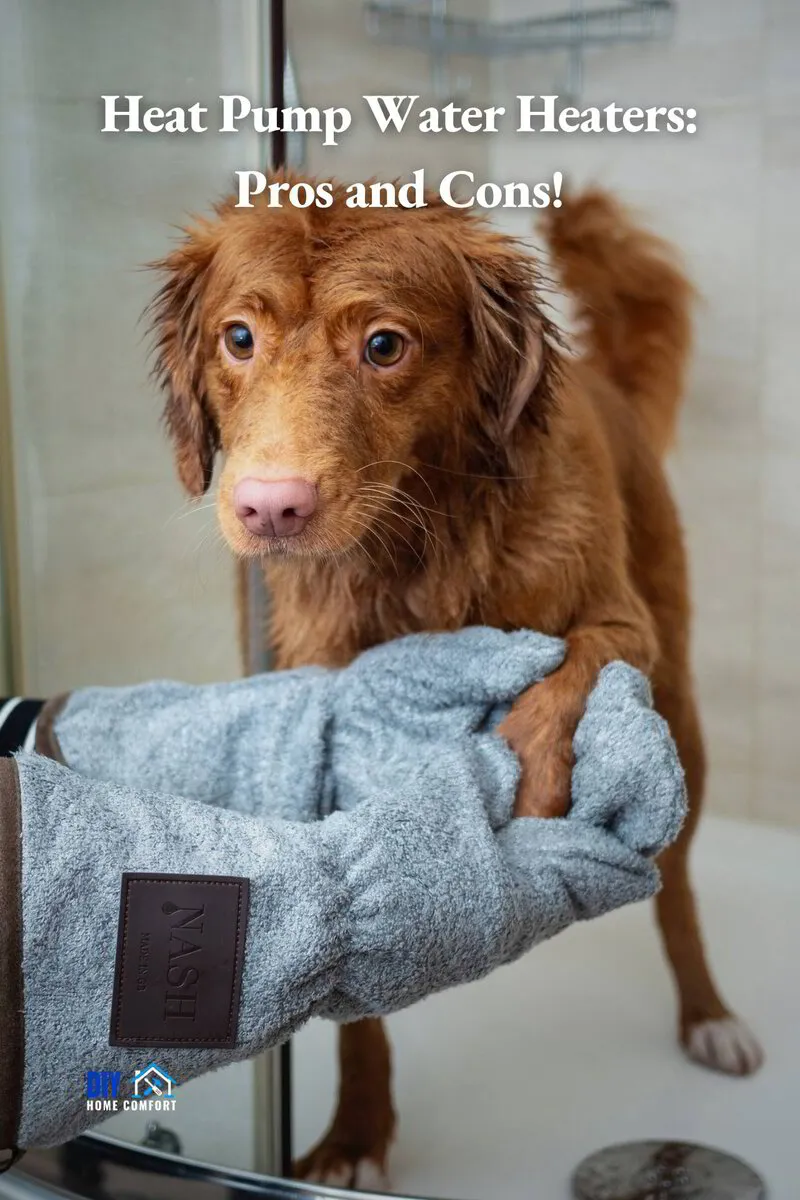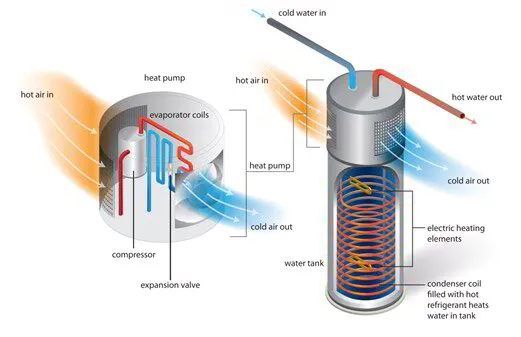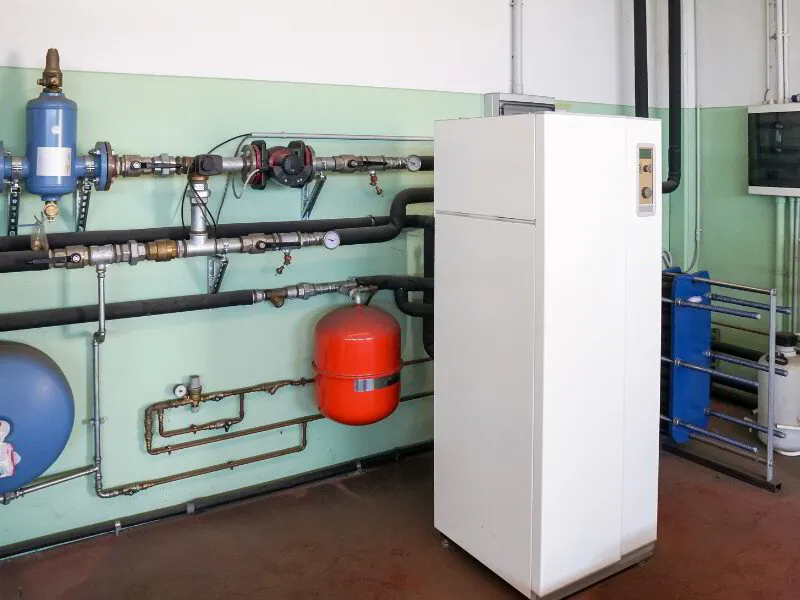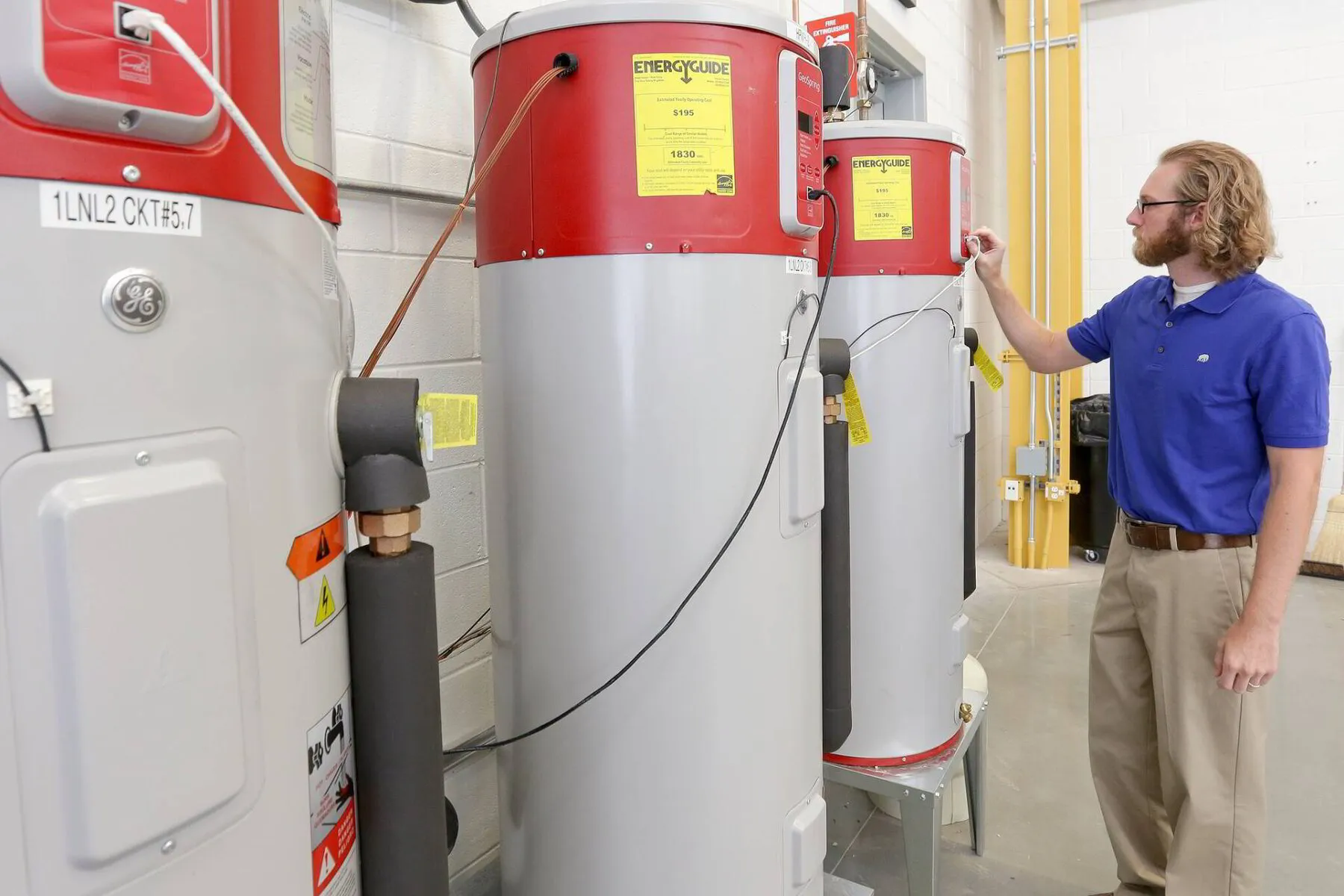Water heaters are essential home appliances that provide warm water for most of our daily activities, including bathing, washing dishes, and doing laundry.
If you're considering upgrading your water heater, you might want to consider a heat pump water heater.
In this article, we'll delve into the pros and cons of heat pump water heaters to help you make an informed decision.
📘 Key Takeaways
- Energy Efficiency: Heat pump water heaters are highly energy-efficient, using less electricity, reducing greenhouse gas emissions, and offering lower operating costs compared to traditional water heaters.
- Versatility: These heaters can operate in a wide range of temperatures, making them suitable for various climates.
- Types of Heat Pump Water Heaters: There are two main types - storage tank and tankless hybrid models, each with unique advantages and disadvantages.
- Long-term Benefits: Despite higher upfront costs, heat pump water heaters provide long-term benefits, including a longer lifespan and lower maintenance costs.
- Considerations: Potential drawbacks include specific installation requirements, limited effectiveness in cold climates, potential noise levels, and higher maintenance and repair costs.
💧 Understanding Heat Pump Water Heaters
Heat pump water heaters are water heaters that extract heat from the air or ground to warm water instead of generating heat through electrical resistance or combustion.
This makes them highly energy-efficient and environmentally friendly, as they use less electricity to generate heat and produce fewer greenhouse gas emissions than traditional water heaters.
Heat pumps operate similarly to refrigerators, using an evaporator coil and a compressor to extract heat from the surrounding air and transfer it to the water stored in the tank.
How Heat Pump Water Heaters Work
When you turn on the hot water in your home, cold water flows into the heat pumps storage tank.
The heat pump then extracts heat from the surrounding air or ground and transfers it to the water, raising its temperature.
As warm water is used in your home, more cold water enters the tank and gets heated again by warm air.
The cycle continues until the tank is filled and heated to the desired temperature.
One of the benefits of heat pump water heaters is that they can operate in a wide range of temperatures, from as low as 40 degrees Fahrenheit to as high as 120 degrees Fahrenheit.
This means they can be used in various climates, making them a versatile choice for homeowners.
Learn how a Tankless Heat Pump Water Heater Works
Types of Heat Pump Water Heaters
There are two main types of heat pump water heaters:
- storage tank water heaters
- tankless water heaters.
Storage tank heat pump water heaters have a storage tank that stores heated water until needed.
On the other hand, tankless hybrid water heaters only heat water as it's needed and don't have a storage tank.
Both types of heat pumps have their unique advantages and disadvantages.
Storage tank heat pump water heaters are typically more affordable than tankless models, making them a popular choice for homeowners on a budget.
They also have a larger capacity, meaning they can supply hot water to multiple fixtures simultaneously.
However, they take up more space and can be less energy-efficient than tankless models.
Tankless hot water heaters are more energy-efficient than storage tank models, as they only heat water as needed.
This means they use less electricity and can save homeowners money on their energy bills.
They also take up less space and can be installed in smaller areas.
However, they are typically more expensive than storage tank models and may not be able to supply enough hot water for larger households.
Choosing between a storage tank and a tankless heat pump water heater will ultimately depend on your individual needs and preferences.
It's important to consider factors such as your budget, household size, and hot water usage when deciding which type of heat pump or tankless water heater to install.
Energy Efficiency
Heat pump water heaters are highly energy-efficient compared to traditional water heaters.
According to Energy Star, heat pumps can save you up to $3,500 on energy costs over their lifetime.
Since they rely on ambient air temperature for heat, they use significantly less electricity than their electric or gas counterparts, making them an excellent choice for families looking to save on energy costs.
Additionally, heat pump water heaters have a unique feature that allows them to operate in "economy" mode, which further reduces energy consumption.
Economy heat pump mode also reduces the water temperature slightly during periods of low demand, such as when you're at work or asleep, and heats it back up when demand increases.
This feature helps to save even more energy and reduce your utility bills.
Lower Operating Costs
Heat pump water heaters require less energy to heat water, leading to lower operating costs.
Since they rely on ambient air temperature, they don't use fuel or electricity to create heat, leading to significant savings on energy costs.
They also have a longer lifespan than traditional electric water heaters, lasting up to 15 years with proper care, which helps to reduce the cost of replacing them over time.
In addition to lower operating costs, heat pump water heaters also have lower maintenance costs.
Conventional water heaters require regular maintenance, such as flushing the tank and replacing the anode rod, to prevent corrosion and extend their lifespan.
Heat pump water heaters, on the other hand, don't have a tank and don't require the same level of maintenance, making them a more convenient and cost-effective option.
Environmentally Friendly
Heat pump water heaters are environmentally friendly since they don't produce harmful emissions.
Unlike traditional water heaters that run on natural gas or propane, heat pump water heaters use electricity to power the compressor and evaporator coil, resulting in fewer greenhouse gases.
They're an excellent choice for families looking to reduce their carbon footprint.
Furthermore, heat pump water heaters can also be powered by renewable energy sources, such as solar panels or wind turbines, making them even more environmentally friendly.
Using renewable energy to power your heat pump water heater can reduce your reliance on fossil fuels for heat energy and further reduce your carbon footprint.
Longer Lifespan
Heat pump water heaters have a longer lifespan than traditional water heaters since they don't encounter the same issues with leaks or corrosion.
With proper maintenance, a new heat pump water heater can last up to 15 years, making it a wise investment.
Another factor that contributes to the longer lifespan of heat pump water heaters is their durability.
Heat pump water heaters are built with high-quality materials designed to withstand harsh weather conditions, making them a reliable and long-lasting option for homeowners.
Eligibility for Rebates and Tax Credits
Many heat pump water heaters are eligible for rebates and tax credits, making them a cost-effective option for homeowners.
Since they're energy-efficient, many states and utility companies offer incentives for families that purchase and install them.
You can check with your local government agency or utility provider to see if there are any ongoing programs you can take advantage of.
Additionally, installing a heat pump water heater can increase the value of your home and make it more attractive to potential buyers.
With the rising demand for energy-efficient homes, investing in a heat pump water heater can be a smart financial decision in the long run.
Government Rebates for Heat Pump Water Heaters:
Check out these resources to learn whether you qualify for a heat pump water heater rebate in the US or Canada.
US:
Database of State Incentives for Renewables & Efficiency (DSIRE)
Federal Tax Credits for Energy Efficiency
Canada:
Government of Canada Energy Retrofits and Grant Amounts
Efficiency Nova Scotia Heat Pump Rebate Program
BC Hydro: Heat Pump Water Heater Rebates
Inadequate Water Heater Size
One of the most significant cons of heat pump water heaters is their higher upfront cost.
Compared to conventional hot water heaters, heat pump water heaters require a more significant investment, which can be a barrier for some homeowners.
However, it's important to note that the cost savings over the lifespan of the heat pump efficiency of the unit can offset the higher upfront cost.
Additionally, some utility companies offer rebates or incentives for homeowners who purchase energy-efficient appliances, which can help offset the initial cost of a heat pump water heater.
Installation Requirements
Heat pump water heaters have different installation requirements than traditional water heaters.
They require more space and a specific setup for optimal performance.
This can complicate the installation process, leading to higher installation costs.
It's important to hire a professional plumber or HVAC technician with experience installing heat pump water heaters to ensure the electric water heater unit is installed correctly and properly.
Limited Effectiveness in Cold Climates
Another potential drawback of heat pump water heaters is their limited effectiveness in colder climates.
Since they rely on ambient air temperature to heat the water, they may not perform as well in areas with colder temperatures.
When the air temperature drops below about 40°F (4.4°C), heat pump water heaters must work harder to extract heat from the surroundings, leading to lower performance and energy costs.
In these situations, homeowners may need to supplement their heat pump water heater with another heating source, such as a traditional water heater or a solar water heater.
Noise Levels
Heat pump water heaters can be noisy since they require a compressor to operate.
The noise level can be a concern for families with bedrooms near the hot water heater. However, newer models are designed to operate more quietly.
Homeowners can also take steps to reduce the noise level of their heat pump water heater, such as installing it in a location that is away from living spaces or adding sound insulation around the unit.
Maintenance and Repair Costs
Finally, heat pump water heaters have higher maintenance and repair costs than traditional water heaters.
Heat pump compressor and evaporator coils require regular maintenance to ensure optimal performance.
If they wear out or break down, they can be expensive to replace, leading to additional expenses for homeowners.
However, regular maintenance can help extend the unit's lifespan and prevent costly repairs.
Homeowners should follow the manufacturer's recommendations for maintenance and schedule regular inspections with a professional technician.
Overall, while heat pump water heaters offer several benefits, they also have some drawbacks that homeowners should consider before purchasing.
By weighing the pros and cons and consulting with a professional technician, homeowners can decide whether a heat pump water heater is the right choice for their home.
💧 Final Thoughts on Heat Pump Water Heaters Pros and Cons
Heat pump water heaters have their pros and cons.
They offer significant energy savings, cost savings, and environmental benefits.
However, they also have higher upfront costs, installation requirements, and maintenance and repair costs.
Before deciding on a heat pump water heater, consider your family's needs and budget, and consult with a professional to determine if it's the right choice for your home.
Want to learn more about your home's water heater? Check out our other water heater articles!
Scott Harding
Scott is the main author of DIY Home Comfort. He's also an experienced HVAC technician that enjoys home renovation and spending time with his family. You can find out more about him here.






